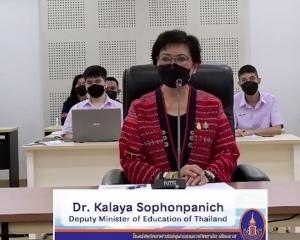There is merit in Don Brash's call for merit pay for teachers, argues Pete Lyons.
I recently had an interview for a job at a private school. In the interview, the principal said: "We mainly cater for international students and the children of New Zealand residents. They want their children to have the best opportunities to succeed academically."
My impression of the school was it was good at achieving this for its pupils. I was offered the position but turned it down for personal reasons. But the experience got me thinking about the status of our state schooling system and why parents would choose these alternatives.
I have taught in a variety of New Zealand schools for more than 20 years. During that time, I have encountered many outstanding Kiwi teachers in a variety of subjects. Few are still teaching in the state system.
There is something fundamentally wrong in our schooling system. My belief is the flaw relates to incentives.
Why is there such an attrition rate? One reason is that secondary teaching can initially be very brutal. Fronting up each day to more than 100 pupils requires a rare combination of interpersonal skills, physical and mental stamina, and sheer bloody-mindedness.
There is also a basic requirement of intellectual agility. It can be a very lonely job because, as the only adult in the classroom, you need to keep control while at the same time motivating and communicating effectively.
Those who survive these first few years become battle hardened. They appreciate that effectiveness is more important than affection, yet the two are not mutually exclusive. There is a very subtle balance that needs to be found.
But once these skills are acquired, incentives can become important. It is a rare individual who can teach year in and year out without being drained of energy or enthusiasm.
I believe teaching in state schools has the unfortunate effect of spitting out many of the most competent practitioners at the point when they have the most to offer.
They move into management, out of teaching or into the private sector of education. This is a major problem we need to address.
During the past few decades, the job has become more difficult but also more crucial.
Educational achievement defines employment options more than ever. It is much harder for a 15-year-old to leave school with no qualifications and pick up a job or apprenticeship. These pupils are staying on, yet the system has not adjusted sufficiently to cater for them.
Don Brash and Act New Zealand believe what our schooling system needs is more competition. This involves competition between schools as well as performance pay for teachers. Parents and pupils would choose schools based on performance.
The schools that were successful would attract more funding. As in the business world, this would allow them to expand and take over less successful schools.
These could then be turned around through the application of successful management techniques. The market for teachers would also be energised with performance pay, allowing principals to reward, retain and recruit the best teachers for their school.
Creating a true market for schools and teachers would encourage greater efficiency and higher levels of achievement and innovation.
I believe the introduction of market forces into the education system has some merit. The present system is moribund and relies overwhelmingly on teacher goodwill and self-motivation.
It tends to result in a culling of the best and brightest teachers from the classroom just as they become most effective.
However, the market that really needs to be created and nurtured is the market for teachers rather than schools. If we accept the concept of equality of opportunity, all state schools should be providing a quality education for our children.
Schools should therefore be a vehicle for quality teaching. It is the quality of the teachers rather than the schools that is paramount.
A truly effective market for teachers would be characterised by certain supply and demand factors that are now absent. On the supply side, a large pool of quality candidates who have been well trained in effective classroom techniques is needed.
On the demand side, schools need the funding to enter the market and bid for the best-quality teachers. The funding must ensure schools can compete with law, accounting, IT and other lucrative career options for graduates.
The flaw in Dr Brash's model is not in the merits of creating a competitive market for teachers but rather the absence of discussion about funding such a market.
There is little point in creating this market if the overall funding of teacher salaries is capped or fails to keep pace with inflation or reflect improvements in overall teacher performance.
What would happen is very well-paid teachers would concentrate in certain schools, and less competent and lower-paid teachers would be left to staff the remaining schools, creating a zero-sum game with no overall increase in school quality. It would magnify the existing inequalities in our society.
Teacher unions are bitter opponents of merit pay for teachers. They cite the difficulties in objectively appraising teachers or the risk of principals acting as feudal lords in dishing out pay to those they favour.
The reality is the present system has just as many flaws and is just as subject to favouritism and nepotism.
If I were to use one word to describe the employment conditions of teachers in the past few decades, it would be "stagnation".
We are fortunate most people enter teaching for altruistic reasons, and many maintain their enthusiasm and drive without needing monetary compensation for effort or ability.
The present environment is characterised by periodic bouts of acrimonious negotiations between unions and government. It is time-consuming and wasteful. It is also demeaning to teaching as a profession.
Unfortunately, our politicians work in a three-year time horizon. The dividends from a well-funded and energised teaching profession would be long-term and well beyond an electoral cycle.
If Dr Brash's calls for the introduction of market policies in education is to warrant serious debate, it must come with a clear outline of the overall funding mechanism for the market for teachers in New Zealand.
• Peter Lyons teaches economics at St Peter's College in Epsom and has written several economics texts.











